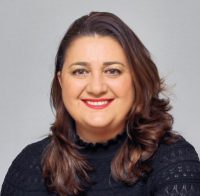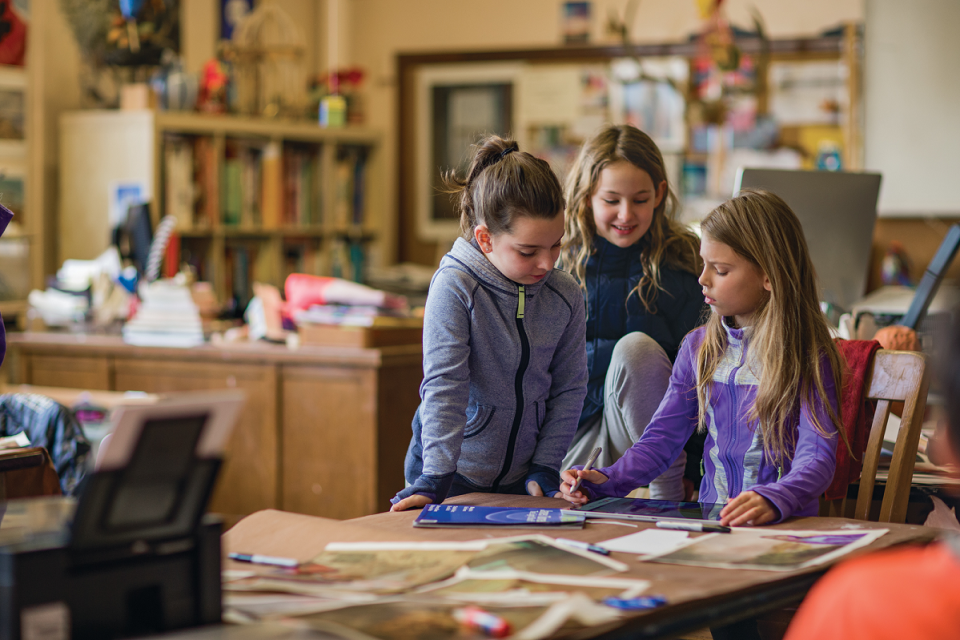 Microsoft Bulgaria, in collaboration with Telelink Business Services, launched Dream Space – a STEAM learning hub offering immersive, research-based experiences to all Bulgarian students and teachers for free. We spoke with Albena Spasova, Senior Sales Manager at Microsoft about the importance and opportunities this project brings to Bulgarian schools and teachers.
Microsoft Bulgaria, in collaboration with Telelink Business Services, launched Dream Space – a STEAM learning hub offering immersive, research-based experiences to all Bulgarian students and teachers for free. We spoke with Albena Spasova, Senior Sales Manager at Microsoft about the importance and opportunities this project brings to Bulgarian schools and teachers.
Can we start with the meaning behind STEAM itself? What does it mean, and what is STEAM education? How is it different from the learning process we’ve known for years, and what are the benefits?
STEAM education gets its name from the scientific fields on which it focuses – science, technology, engineering, arts, and mathematics. The STEAM program is a specific approach to teaching and learning that combines the listed subjects and the skills they entail and motivates students to develop their problem-solving skills and agility. This approach gives children the freedom to be curious, to seek and discover creative solutions to problems, to develop their social-emotional skills, and to build their understanding of how the skills and attitudes they make in school transfer to real life. By developing their hard and soft skills, the STEAM program prepares students for career paths in professions that might not still exist. Technologies are developing at an extremely fast pace and are changing the professional environment. With the development of AI technologies, it is expected that in the coming years, a significant part of the professions related to tracking and collecting data, reporting, and other repetitive tasks will be fully automated. However, there are some soft skills that a computer cannot reproduce. Such are teamwork, creativity, quick adaptation to changes in the environment, and others. It is these skills that STEAM education develops, especially at a young age.
Some schools in Bulgaria already have STEAM centers. Why did you choose to open Dream Space center in Sofia?
We believe that students are the ones who create our future, which is why it is essential to support them with all the necessary tools, resources, and learning opportunities through which they can develop the necessary skills and competencies to build our future. Dream Space Bulgaria is a learning hub offering immersive, research-based experiences to all Bulgarian students and teachers for free. This form of education should be accessible to everyone in the country; therefore, Dream Space in Sofia should be the first step into empowering everyone to see the power of digital technology and STEAM in exciting new ways and the crucial role that these areas have now and will have in the future. We witnessed a very high demand for the program. Just in one month, we have already welcomed over 500 students from all over the country at Dream Space. It is a fantastic project – and the fact that we had a fully booked program until the end of the calendar year only three days from launch, speaks for itself. With our workshops, we provide schools with a glance at how effective STEAM teaching and learning with their own students can look like, and we supply them with the necessary resources and support to transfer the Dream Space methodology to their own classrooms and their own STEAM centers.
What are Dream Space’s goals, and how does it plan to achieve them?
Our core purpose and mission at Microsoft is to empower every person and organization on the planet to achieve more. The entire experience at the Dream Space center is designed to reflect this very mission. Dream Space aims to present to teachers, students, and parents the innovative STEAM workshops in which the student is at the center of the learning process. STEAM education develops specific knowledge, skills, behaviors, and values that help students discover and create advanced solutions. Each Dream Space experience is built on this philosophy and puts learners in the role of researchers. In Dream Space, students use innovative, fascinating, and fun technologies such as virtual reality, Micro: Bit, MakeCode Arcade, Sphero Edu robots, Arduino, and Minecraft: Education Edition to create the future. Also, for the exciting Dream Space experience to have a lasting effect on students’ motivation, tenacity, and proactivity, each class will have its own mission to be accomplished together. The details of the missions and presentations to the students will be specified to the teacher in advance. At the end of the school year, classes from all over the country, having completed their missions, will demonstrate their STEAM skills progress at the Dream Space Annual Awards. This kind of experience will enhance children’s and teachers’ STEAM skills and computational thinking alongside crucial social-emotional skills such as empathy, creativity, ethical decision-making, and collaboration.
You developed the STEAM center together with Telelink Business Services. Does the business have a place in secondary education, and how important do you think it is to be involved in children’s education?
In Bulgaria, we have more than 565,000 students in more than 2,000 primary and secondary schools who study science, technology, engineering, arts, and math through STEAM teaching. As our kids are creators of our future, it is our responsibility to teach them how to develop skills and competencies to develop future job skills. We are impressed to see teachers and principals participate in our workshops with their students and happy to receive many inquiries on how to recreate the Dream Space experience in their schools.

We have seen continuous changes in the educational system in Bulgaria in recent years. How do the Dream Space center and STEAM learning fit into these changes? Do you work together with the Ministry of Education?
Dream Space shows Microsoft’s commitment to the Bulgarian educational system and society, which we have been part of for over 20 years. This is one step further – a STEAM learning hub where every teacher and student can experience science and technology in a unique way. Dream Space is the next step of our partnership with the Ministry of Education in Bulgaria. Together, we have created space for all K12 students and teachers to keep in touch with innovation and gain digital skills. 1,2M students and teachers now have unique user accounts and profiles to sign in with a single profile to any of the systems and platforms used by the Ministry and the schools. Microsoft Teams classrooms for each class are provisioned automatically. Together with Telelink Business Services, we created the “Digital Backpack”, a platform for schools to manage all their activities with students and parents. In today’s day and age, students’ safety is at the heart of all the solutions we have created together. We remain committed to working closely with the Ministry of Education as well as the wider education sector to support students in acquiring digital skills needed for the jobs of the future.
Students are ready for next-generation education, but can teachers keep up? What actions are you taking to facilitate educators?
What differentiates Dream Space from other platforms is our approach to learning. Our center also brings learning experiences for teachers and communities to enhance their STEAM skills and computational thinking by challenging them to look for solutions to real problems. That creative approach has the power to spark curiosity in children, ignite imagination and drive inquiry about the inter-relatedness of things. At Dream Space, we demonstrate what STEAM learning and teaching look like effectively. Teachers register their entire classes to visit us. They share with us the learning goals in at least two subjects for which they want to see a demonstration of how they can be achieved by each of their own students during the Dream Space workshop. We have created this experience to support schools in envisioning how they can use their STEM centers more effectively and bring the Dream Space method to work both in their classrooms and in their schools. To build up the learning experience, we are launching a Dream Space Newsletter, Dream Space Teachers Academy, and Dream Space TV – all aimed at supporting teachers to build their own practice around effective STEAM teaching and learning and purposeful 21st-century skills development.
STEAM education requires quite different learning resources than just textbooks, which can be a financial problem for Bulgarian schools. How do you help overcome it?
We recognize that STEAM learning puts many students at a disadvantage compared to their peers because they may lack the technology or connectivity to complete classwork from school or home. Educational equity is key to our work, and we are exploring many possibilities to help students in need of support during times of uncertainty. As I previously mentioned, the education is free, with teachers required just to pre-register to reserve a spot for themselves and their students. Also, we are ready to meet with each school where STEAM skills building is possible in terms of devices and the internet. By 2026, all schools will have equipped STEAM centers funded by the European Union’s Recovery and Resilience Fund resources. We are here to support the teachers and skill them to transfer STEAM knowledge to every student. Microsoft additionally plans to invest one million BGN within the next five years to upgrade Dream Space’s STEAM laboratories and material base to fulfil students’ and teachers’ needs for resources and good practices. All students and teachers come with unique superpowers, but some have doubts if they will be able to create solutions to the global problems we pose to them. Everyone leaves with surprise, excitement, and satisfaction that they have completed the missions set.





